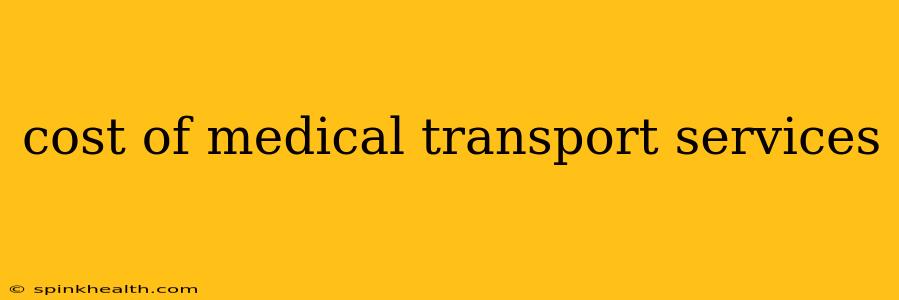The Unexpected Costs of Medical Transport Services: A Patient's Guide to Navigating the Maze
The jarring sound of an ambulance siren, the flashing lights cutting through the night – these are images often associated with medical emergencies. But behind the urgency lies a complex reality: the often-hidden and sometimes staggering cost of medical transport services. This isn't just about the immediate crisis; understanding the financial implications beforehand can make a significant difference in managing the stress and burden of an unexpected medical event.
This isn't a simple answer; the cost of medical transport varies wildly based on several key factors. Let's unpack those factors and explore the ways you can navigate this crucial aspect of healthcare.
What Factors Determine the Cost of Medical Transportation?
Several critical factors influence the final price tag:
-
Distance: The further the transport, the higher the cost. Rural transport often involves longer journeys, resulting in increased charges. Think of it like a taxi ride – the longer the distance, the more expensive it gets.
-
Type of Vehicle: Basic ambulance transport is different from specialized transport, such as neonatal or critical care transport. Specialized units usually require more trained personnel and advanced equipment, significantly increasing the cost.
-
Level of Care: The level of medical attention required during transport directly impacts the cost. A patient needing constant monitoring and advanced life support will incur higher charges than someone requiring basic transportation.
-
Insurance Coverage: Your health insurance plan plays a crucial role. Some plans cover a portion or all of the transport costs, while others may have significant limitations or require pre-authorization. It's essential to understand your policy's specifics.
-
Time of Day/Day of Week: Like many services, medical transport may charge more for services provided during peak hours or on weekends and holidays.
-
Additional Services: Any additional services provided during transport, such as the use of specialized equipment or the need for multiple personnel, will add to the overall cost.
How Much Does Medical Transportation Typically Cost?
There's no single answer to this question. The cost can range from a few hundred dollars for a basic short-distance transport to several thousand dollars for long-distance specialized transport. The price can easily skyrocket in complex situations demanding advanced life support. Always request a cost estimate if possible before transport, especially if you're concerned about affordability.
What are My Options if I Can't Afford Medical Transport?
Facing a hefty medical bill can be incredibly stressful. Here are some avenues to explore if you can't afford medical transport:
-
Negotiate with the Provider: Many transport companies are willing to work with patients facing financial hardship. Don't hesitate to discuss payment options and explore potential discounts or payment plans.
-
Explore Financial Assistance Programs: Many hospitals and healthcare providers offer financial assistance programs or charity care for individuals with limited income.
-
Medicaid/Medicare: Government-funded programs like Medicaid and Medicare may cover some or all of the costs, depending on your eligibility.
-
Charity Organizations: Several charities specialize in providing financial assistance for medical expenses. Research local options in your area.
Does my health insurance cover medical transport?
This entirely depends on your specific health insurance plan. Some plans have comprehensive coverage for emergency medical transport, while others may limit coverage to certain situations or require pre-authorization. It’s crucial to review your policy's details, contact your insurer directly, and understand what your plan covers before a medical emergency arises.
What are the different types of medical transport services?
Medical transport encompasses a spectrum of services, each designed for specific needs:
-
Basic Life Support (BLS): This involves transportation with basic emergency medical care, often suitable for patients with less critical conditions.
-
Advanced Life Support (ALS): This provides advanced medical care during transport, including medication administration, airway management, and cardiac monitoring, usually for patients with more serious conditions.
-
Critical Care Transport: This is highly specialized transport for patients requiring the highest level of medical care, often involving specialized equipment and personnel.
Navigating the cost of medical transport services requires proactive planning and a thorough understanding of your insurance coverage and available resources. While the expense can be significant, understanding your options and planning ahead can alleviate a considerable amount of stress during an already difficult time. Remember to always clarify costs before transport whenever possible.

